Health and Wellness
Health and wellness refer to the state of being in good physical, mental, and social well-being. It is not merely the absence of disease or infirmity, but a holistic approach to overall well-being.
Key Concepts:
- Physical Health: This refers to the proper functioning of the body and its systems. It involves maintaining a healthy diet, regular physical activity, adequate sleep, and avoiding harmful substances.
- Mental Health: Mental well-being encompasses emotional, psychological, and social aspects. It involves managing stress, seeking support when needed, and maintaining a positive outlook.
- Social Health: Social well-being involves forming and maintaining healthy relationships, contributing to the community, and having a support network.
- Emotional Health: Emotional wellness involves understanding and managing one's feelings, coping with stress, and maintaining a positive outlook on life.
- Spiritual Health: Spiritual well-being includes having a sense of purpose, seeking meaning in life, and engaging in activities that align with personal values and beliefs.
Study Guide:
When studying health and wellness, it is important to consider the various dimensions of well-being. Here are some key points to focus on:
- Define health and wellness and explain the concept of holistic well-being. Provide examples of how each dimension of health (physical, mental, social, emotional, and spiritual) contributes to overall wellness.
- Discuss the importance of maintaining a balanced diet, regular exercise, and sufficient sleep for physical health. Describe the effects of unhealthy habits such as smoking, excessive alcohol consumption, and poor nutrition.
- Explain the significance of mental health, including stress management, seeking help for mental health issues, and the impact of social support on well-being.
- Explore the role of social health in building and maintaining relationships, contributing to the community, and developing a support network.
- Discuss the significance of emotional health, including strategies for coping with stress, maintaining a positive outlook, and understanding one's emotions.
- Examine the concept of spiritual health and its impact on overall well-being. Discuss how personal values, beliefs, and a sense of purpose contribute to spiritual wellness.
- Provide examples of how individuals can promote their own health and wellness through lifestyle choices, self-care practices, and seeking professional help when needed.
- Explore the impact of societal factors, such as access to healthcare, social support systems, and community resources, on the health and wellness of individuals and communities.
By understanding and applying the principles of health and wellness, individuals can strive to achieve a balanced and fulfilling life in all aspects of well-being.
[Health And Wellness] Related Worksheets and Study Guides:
.◂Biology Worksheets and Study Guides High School. Genetics and heredity II
Worksheet/Answer key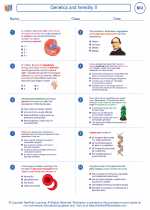 Genetics and heredity II
Genetics and heredity II  Worksheet/Answer key
Worksheet/Answer key Genetics and heredity II
Genetics and heredity II  Worksheet/Answer key
Worksheet/Answer key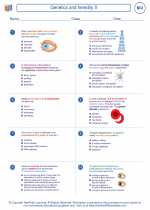 Genetics and heredity II
Genetics and heredity II  Vocabulary/Answer key
Vocabulary/Answer key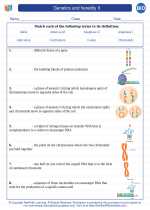 Genetics and heredity II
Genetics and heredity II  Vocabulary/Answer key
Vocabulary/Answer key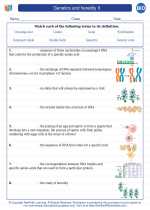 Genetics and heredity II
Genetics and heredity II  Vocabulary/Answer key
Vocabulary/Answer key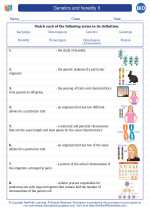 Genetics and heredity II
Genetics and heredity II  Vocabulary/Answer key
Vocabulary/Answer key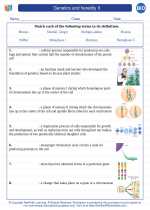 Genetics and heredity II
Genetics and heredity II  Vocabulary/Answer key
Vocabulary/Answer key Genetics and heredity II
Genetics and heredity II  Vocabulary/Answer key
Vocabulary/Answer key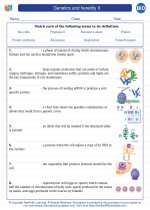 Genetics and heredity II
Genetics and heredity II  Vocabulary/Answer key
Vocabulary/Answer key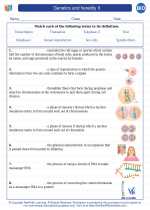 Genetics and heredity II
Genetics and heredity II 

 Worksheet/Answer key
Worksheet/Answer key
 Worksheet/Answer key
Worksheet/Answer key
 Vocabulary/Answer key
Vocabulary/Answer key
 Vocabulary/Answer key
Vocabulary/Answer key
 Vocabulary/Answer key
Vocabulary/Answer key
 Vocabulary/Answer key
Vocabulary/Answer key
 Vocabulary/Answer key
Vocabulary/Answer key
 Vocabulary/Answer key
Vocabulary/Answer key
 Vocabulary/Answer key
Vocabulary/Answer key

The resources above cover the following skills:
LIFE SCIENCE (NGSS)
Heredity: Inheritance and Variation of Traits
Students who demonstrate understanding can:
Ask questions to clarify relationships about the role of DNA and chromosomes in coding the instructions for characteristic traits passed from parents to offspring.